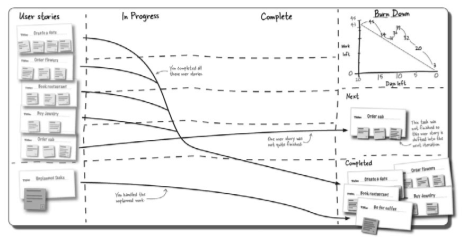Mainstream Agile with XP?
I hadn’t realized the Head First series now has a book on software development. Curious, I took a glance at the table of contents. Topics include:
- TDD
- User Stories
- Burn Down Charts
- Continuous Integration
- Test Coverage
Agile and XP practices are starting to be assumed. Maybe Ambler and others are right that Agile has really crossed the chasm. Just a year or so ago I bemoaned the lack of unit testing examples in Head First Java 2nd Edition where they went with the lame old main() method to demonstrate code. Now we have whole chapters devoted to TDD.
If you can’t honestly put unit testing or continuous integration on your resume you might want to stop sitting on the sidelines and get up to speed.
Standup in the Dark
The lights went out to work today after a winter storm rolled through Sacramento. In an agile spirit we still held one of our standups after moving near one of the windows.
Scrum Master: “OK, anyone have anything to report?”
Team Member #1: “I was really productive right up until the lights went out.”
Team Member #2: “I have an impediment, no machine, and no light.”
Team Member #3: “Turns out I won’t need a migration to the QA server today.”
Scrum Master: “Oh, and the review is at 12:30 next week, and I’m scheduling the retrospective today if we get power.”
Team Member #4: “And you can add lunchtime sprint reviews to that list of things to look into right now.”
When To Code Review Changes Versus the Whole File

Reading through some old documentation today written up a few years ago by our Agile coach I came across a suggested rule of thumb for code reviews:
- If more than X lines of code changed in a file then do a full code review of the file.
- If less than X lines of code changed you can just review the diffs.
- Developers should decide on where to set the bar for lines of code.
Strikes me as a pretty reasonable option. We’ve been reviewing whole classes except in a few circumstances, but we never set a rule on how many lines of code make it worth doing a full review. Maybe 20 lines is a good number.
Trading Haskell for a New Language
After committing to Haskell for my new language in 2007 it was largely a failed experiment. I never found a good learning Haskell book. I went through a few tutorials and nothing really clicked much. I found myself wanting to hack around on Ruby rather than mess around with Haskell syntax.
I really prefer a comfortable well-written book introduction to a new language. Something like the Ruby Pickaxe book or Learning Perl. Maybe this year will be Erlang or Common LISP since they both seem to have nice introductory books available.
Old Dotcom Swag

I was cleaning out the closet today when I came across this cute little onesie from an old dotcom I worked for. I had my first daughter while working as a web development manager for XUMA. She never actually wore the onesie because it got packed up in a box for our move to Sacramento.

We were an e-commerce vendor doing a lot of projects on ATG Dynamo. There was an attempt to morph into a product company selling ASP services or in the new Web 2.0 world, Software as a Service. I’m glad the ASP model has finally become common place. If you need some functionality like a CRM, managed hosting, or security monitoring you usually a lot better off just utilizing an ASP option.
